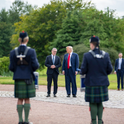Nothing became the new Labour leader less during his conference speech than his comments on Iraq. He put it thus: “many [Labour MPs] sincerely believed that the world faced a real threat. I criticise nobody faced with making the toughest of decisions… But I do believe we were wrong...to take Britain to war and we need to be honest about that.”
The implication, it seems, is that Ed Miliband did not believe Saddam Hussein’s regime posed a real threat to the world. His argument on this is loosely worded, but that seems the best interpretation. And it is a disturbing position for a leader of the opposition to take.
Miliband has used his opposition to the Iraqi intervention—an opposition which, allegedly, none of his political colleagues remembers him voicing—to cement support from an activist and trade union base which would overwhelmingly agree with him. What he has not done is prompt that base to think.
To give the impression that the world does not face “a real threat” from dictators who seek to acquire WMD is hugely irresponsible. Anyone in serious politics who now wishes to oppose, in retrospect, the Labour government’s decision on Iraq, must give his party an account of how he sees a world in which one of the gravest strategic threats is the proliferation of nuclear, chemical and biological weapons. What’s more, we cannot simply deny the danger that terrorists might seek to use these weapons against civilian populations.
In Britain, while the threat of home-grown terrorism has diminished, it has done so through extensive and largely successful intelligence and police work which thwarted some dozen serious planned attacks since the 2005 bombings. Two, however, were not stopped by preventive measures: the Haymarket car bomb and subsequent Glasgow airport attack were either detected by police work, or failed to detonate.
Earlier this month, the head of MI5, Jonathan Evans, warned it would be a matter of time before a terrorist atrocity occurred once more on British streets. Al Qaeda has been weakened in Pakistan and Afghanistan, but the al-Shabaab militia group, linked to al Qaeda, has been training jihadists in Somalia and earlier this year killed over 70 people in Uganda. These real threats will only intensify as parts of the world, in Africa and elsewhere, pass out of any effective government control.
There is certainly a critique to be mounted against the way in which we were taken to war. But a responsible leader of a major party—especially the party in power during the Iraq war, whose then leader enthusiastically supported the invasion—cannot pick a few cherries from that critique, fling them to the hall and pass on, bolstered by applause.
Miliband must grapple with the remaining inconvenient facts. The Iraqi regime was murderous—to its own people, to its neighbours and potentially to the region, if not beyond. What was to be done about it, at a time of fading sanctions?
Even if the decision to invade Iraq is now a fact of history, any world leader will face similarly challenging scenarios over the coming years. Iran has taken the lead in threatening the region and the west with WMD, which it continues to attempt to acquire and make operational. Pakistan’s fragile and corrupt government is a nuclear power, with as yet no certainty that it can withstand a jihadist takeover. North Korea has nuclear weapons. It would be suicidally crazy to employ them, but who would bet the house against a suicidally mad move from a country as closed as North Korea?
A leader’s maiden speech is not the place to frame a response to these, and other, global dangers and challenges. But nor is it a place to dismiss one of the central controversies of the past decade with a few glib phrases, especially when advertised by the words: "I've got to be honest with you." It was badly done. Unless Miliband sets out his stall in a more complex and more courageous way, Labour will falter.
Ed Miliband's alarming attitude on Iraq
September 29, 2010












